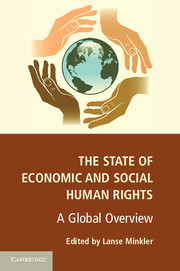Book contents
- Frontmatter
- Contents
- Contributors
- Acknowledgments
- 1 Introduction: Why Economic and Social Human Rights?
- I CORE RIGHTS
- II NONDISCRIMINATION
- III META
- 10 Establishing a Social and International Order for the Realization of Human Rights
- 11 Beyond a Minimum Threshold: The Right to Social Equality
- 12 The Right to Development from a Human Rights Approach: Conceptual Bases, Legal Framework, and Contemporary Challenges
- 13 Constitutional Environmental Human Rights: A Descriptive Analysis of 142 National Constitutions
- 14 Conclusion: Reflections on the Theory and Practice of Economic and Social Rights
- Index
- References
14 - Conclusion: Reflections on the Theory and Practice of Economic and Social Rights
Published online by Cambridge University Press: 05 February 2013
- Frontmatter
- Contents
- Contributors
- Acknowledgments
- 1 Introduction: Why Economic and Social Human Rights?
- I CORE RIGHTS
- II NONDISCRIMINATION
- III META
- 10 Establishing a Social and International Order for the Realization of Human Rights
- 11 Beyond a Minimum Threshold: The Right to Social Equality
- 12 The Right to Development from a Human Rights Approach: Conceptual Bases, Legal Framework, and Contemporary Challenges
- 13 Constitutional Environmental Human Rights: A Descriptive Analysis of 142 National Constitutions
- 14 Conclusion: Reflections on the Theory and Practice of Economic and Social Rights
- Index
- References
Summary
A Theoretical Framework
Human rights scholars and advocates now usually take for granted that economic and social rights are valid human rights. These rights were included in the Universal Declaration of Human Rights (UDHR). The International Covenant on Economic, Social and Cultural Rights (ICESCR) is part of the International Bill of Rights, and has been ratified (as of February 29, 2012) by 160 out of 193, or 82.9%, of all United Nations member-states. For many, the moral argument for recognizing these rights as human rights is at least as compelling as the legal argument: the rights to food, health, housing, social security, work, and education have great intuitive appeal. Economic and social rights have been more acceptable to non–Western governments than civil and political rights, and, whereas Western governments have been reluctant to acknowledge legally binding obligations to fulfill economic and social rights for noncitizens, they have generally recognized them for their own citizens and accept a moral obligation to fulfill them to some extent for noncitizens.
Yet, the contributors to this volume express considerable frustration at the failure of the international community, and even some of its richest states, to implement economic and social rights adequately. An explanation for this failure may be obvious: powerful interests oppose the implementation of these rights. In this, the practical status of economic and social rights is not very different from that of civil and political rights, which are also seriously violated in many countries where powerful interests trample on international law. The truth in this explanation raises practical rather than theoretical problems. However, a law is not a bad law just because it is imperfectly implemented. The fact that there are murders in a country does not entail that the laws prohibiting murder are ill considered.
- Type
- Chapter
- Information
- The State of Economic and Social Human RightsA Global Overview, pp. 365 - 388Publisher: Cambridge University PressPrint publication year: 2013
References
- 2
- Cited by

